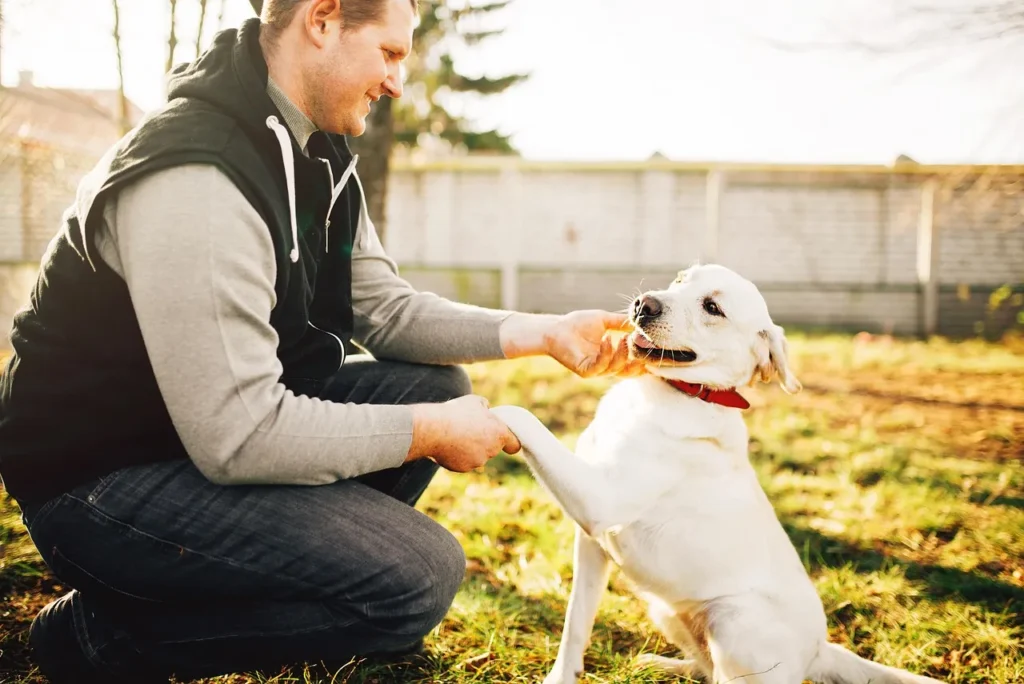

Service dogs are working animals carefully trained to assist individuals with disabilities in a variety of ways, from performing trained tasks that help to ease panic attacks to helping those with mobility issues navigate public spaces safely. Unsurprisingly, they can also provide life-saving support to those with autism spectrum disorder (ASD).
If you’re wondering whether an autism service dog is the right treatment for you, read on. In this post, we’ll cover everything you need to know about autism service dogs, including how they’re officially defined and what kind of support they can provide.
What Is a Service Dog?
Under the Americans with Disabilities Act (ADA), a service dog is defined as a working dog that has been trained to perform at least one task that eases symptoms of a qualifying disability, like these.
They are protected under numerous federal and state laws in the US to ensure they can carry out their role without disruption. They are granted legal rights such as public access rights, exemption from no-pet policies in rental properties, and reasonable accommodation within the workplace.
Service dogs are often categorized based on the kind of support they provide. Guide dogs assist those with sight loss, for instance, while psychiatric service animals support those with mental or emotional disorders. Autism service dogs, on the other hand, are dogs that have been carefully trained to help autistic individuals manage the challenges they face, like sensory overload.
Autism Service Dogs: How They Can Help
Although being autistic brings with it plenty of strengths, it also comes with its fair share of challenges, particularly when navigating a world designed for neurotypicals. Service dogs can be trained to perform several tasks to help autistic individuals manage these challenges and better cope with the stressors of day-to-day life.
The exact tasks an autism service dog performs will depend on their handler’s specific set of needs, though some of the most common tasks include:
- Guide to Exit: During times of distress, a service dog can be trained to help their handler navigate to the nearest exit of the building. They can also lead them away from any uncomfortable or overwhelming social situations.
- Deep Pressure Therapy (DPT): A service dog can be taught to strategically apply their body weight and warmth onto their handler to help ease sensory overload and/or anxiety.
- Grounding Techniques: A service dog can be taught to ground their handler by performing tactile stimulation or redirecting their attention. They can also use grounding techniques to interrupt self-harming behaviors, such as nail biting.
- Communication Support: Many autistic individuals find it difficult to communicate with others and verbalize their thoughts and feelings. A service dog can help alleviate this difficulty by retrieving a communication aid device on command.
- Item Retrieval: A service dog can be trained to retrieve other important items, too, including medication, water, food, or their handler’s phone.
- Crowd Control: A service dog can be trained to perform crowd control, where they strategically circle around their handler to prevent people from getting too close to them. This can help their handler feel at ease when navigating crowded, busy areas.
- Noise Alerts: During times when their handler is overwhelmed and unable to distinguish sounds effectively, a service dog can be trained to alert them to any important sounds (like the doorbell or a fire alarm).
Autism service dogs don’t just offer support through trained tasks; their presence alone can offer immeasurable therapeutic relief and comfort. They can also help foster confidence, provide a strong sense of security, and help their handler establish a consistent day-to-day routine. All of which can greatly reduce stress levels in autistic individuals.
Learn More About Autism Service Dogs Today
Autism service dogs can vastly improve their handlers’ emotional well-being in an array of ways, from performing trained tasks that help them to lead more fulfilling, independent lives, to offering therapeutic comfort during times of distress. They’re also sure to brighten up their handlers’ lives (and homes) with plenty of affection, love, and companionship.
If you feel that an autism service dog may be beneficial for you, don’t delay in getting in touch with a licensed healthcare professional. They will be able to help you determine whether an autism service dog is the right choice for you, and crucially, point you in the direction of local autism service dog charities.
As you consider an autism service dog, keep in mind that they aren’t a good fit for every individual, and there may be other therapeutic interventions that are better suited to your needs. It’s important to be transparent with your healthcare provider and answer their questions accurately and thoroughly. Don’t be afraid to bring a relative (or close friend) with you to help you advocate for yourself.






Leave a Reply